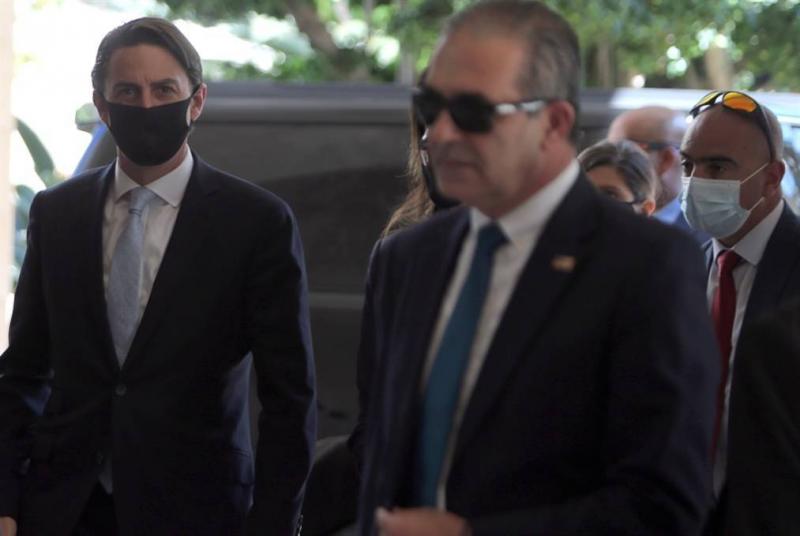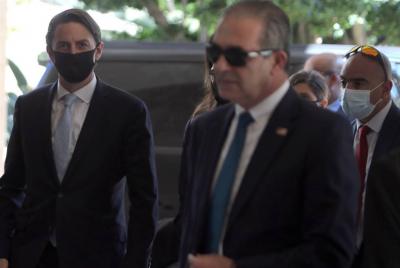"Correcting the official stance, even if belated." This summarizes the presidential meeting held yesterday at the presidential palace, attended by Presidents Michel Aoun, Nabih Berri, and Najib Mikati. This came after three meetings held by the technical committee tasked with studying the proposal from U.S. mediator Amos Hochstein for maritime border demarcation, whose members confirmed the "impossibility of accepting the proposal as it is not based on legal frameworks and constitutes a concession of Lebanon’s rights in its waters and oil wealth." This comes in response to U.S. pressure on those managing the file to provide a final answer to the proposal on a "take it or leave it" basis.
The main decision from the presidential meeting yesterday was to return to the "framework agreement." The presidents called in a statement for the "United States to continue its efforts to complete negotiations according to the framework agreement while preserving Lebanon's supreme interests and regional stability."
According to information, "following the tripartite meeting, another meeting was held with the committee composed of representatives from the presidency, the government, the army command (Hydrography Department), and the Petroleum Sector Management Authority, where the findings of the proposal study were presented." According to leaked atmospheres, it appears that the official Lebanese stance is confused, primarily "due to internal disagreements over managing the file, amidst Berri and Hezbollah's objections to Hochstein's proposal, as they did not participate in the committee." Additionally, officials are caught between not being able to decisively reject the U.S. mediator’s proposal and informing him of this rejection due to their need for Americans on the electricity file, knowing that the U.S. administration uses this for pressure on Lebanon.
Former MP Amal Abu Zeid’s tweet was noticeable yesterday, clarifying that "the Lebanese response to the U.S. mediator’s proposal regarding maritime border demarcation is a presidential consultation," considering that "linking the import of energy and gas to Lebanon to agreeing to the mediator’s proposal is unacceptable, to say the least." The meeting addressed the issue related to "feeling embarrassed about accepting the proposal amidst campaigns of betrayal that speak of Lebanon conceding its rights." This took "a wide space of discussion during the meeting." However, Lebanese officials decided that instead of making decisions that would force the Israeli enemy back to negotiations, they would return to the framework agreement that defines the negotiation mechanism. Notably, "the President had been trying alone during the previous period to reach a settlement with the Americans regarding the demarcation file."
According to "Al-Akhbar," "Berri conditioned the return to the framework agreement for attending the presidential meeting," and those close to him indicated that "the framework agreement is the logical and correct exit, hence they have returned to adopt it once again, after it was confirmed that leveraging the file would be of no personal benefit." On the other hand, those opposing the state's handling of the file believe that "the statement is an evasion of confronting Hochstein, by saying that there is an agreement previously accepted by all, so let us return and adhere to it."
Does Lebanon's position indicate a resumption of indirect negotiations in Naqoura, which were replaced by Hochstein’s shuttle diplomacy between Beirut and "Tel Aviv"? According to information, "the meeting confirmed the necessity of returning to the Naqoura table as stipulated in the framework agreement, after the Americans and Israelis’ approval. Because shuttle diplomacy occurred after the suspension of negotiations in Naqoura, if the U.S. mediator and the Israeli enemy respond positively to the Lebanese invitation, negotiations may be resumed where Lebanon will assert its rights without addition or reduction." It was also learned that "there would be a change in the composition of the Lebanese delegation, especially after Brigadier General Bassam Yassine was retired, and it may be expanded to include more technicians or representatives from several concerned parties, but the matter is still under discussion."
Meanwhile, those close to the military-technical delegation indicated that its members may not agree to participate again, especially as they insist on their viewpoint regarding line 29. Insiders familiar with the demarcation file believe that "the file has been shelved and will be placed on hold currently due to developments in the region and the world."




